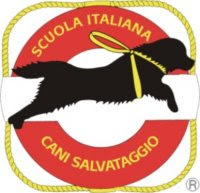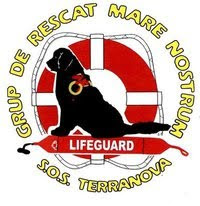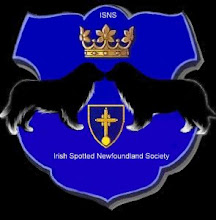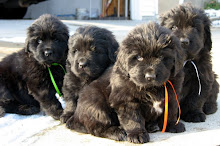
(These stories are for "David" in the hopes that he will endeavor to obtain the help he needs so severely as respects his disdain for dogs.)
"The dog known as the Newfoundland dog is one of the handsomest and best beloved of the dog family. He is distinct from the Labrador dog, which is more slender in make, has a sharper muzzle and is generally 'black in colour with a tawny nose and a rusty spot over each eye'. The Labrador dog and the Eskimo have been credited with the parentage of the Newfoundland species. At home the Newfoundland is made useful for the purpose of drawing loads, being harnessed to small carts and sleighs for carrying wood and other commodities. Abroad like the prophet who 'is not without honour save in his own country', he has been found capable and worthy of much more honourable service, and his fidelity and sagacity have won for him universal esteem. He is an expert swimmer, his feet being webbed and so peculiarly adapted for the exercise. He takes to the water as though it were his natural element, and has so often carried the line to sinking ships, and rescued persons about to drown that such incidents have become quite common. The tribute paid to him by Sir Edwin Landseer, when he named his famous picture of him 'a distinguished member of the humane society', was no more poetical than just. Volumes might be filled with stories of his intelligence and prowess, and it is difficult within present limits to select a due variety of characteristic anecdotes.
The Newfoundland's Generosity
"One of the most marked characteristics of the Newfoundland dog is his generosity to a fallen foe. His temper is said to be uncertain, though this has been questioned by some who have had large experience of him under varying circumstances. Be this as it may, there are many stories told to his honour of his generosity to his enemies in the moment of victory. A Newfoundland dog, who had for some time treated with becoming dignity the impudence of some mongrels who were amusing themselves by snapping and snarling at his heels, suddenly turned and sent the crowd of persecutors flying in all directions, except the ringleader, who fell sprawling in the middle of the street, where he was about to receive the punishment he deserved when a cable car came dashing down the hill, right upon the dogs. The big dog saw the danger at once and sprang aside, but his enemy remained upon his back, too terrified to notice anything. The Newfoundland took in the situation, in a moment sprang back in front of the car, seized the cur in his teeth, and snatched him, still whining and begging for mercy, out of the very jaws of death. Laying him in the gutter, he gave a good-natured wag or two of his tail and went his way. Another Newfoundland much bothered by a small cur who was for ever barking at his heels, but who treated his assailant with sublime indifference, was on one occasion aroused to adopt drastic measures by receiving a bite on his leg. Seizing the cur by the loose skin of his back he carried him down to the quay of Cork and after letting him dangle over the water for a little while, dropped him into it. After watching the animal struggle with the water until nearly exhausted, the Newfoundland plunged in and rescued him. Mr. Jesse gives a fine illustration of this canine chivalry, witnessed at Donaghadee. 'The one dog in this case was also a Newfoundland, and the other was a mastiff. They were both powerful dogs; and though each was good-natured when alone, they were very much in the habit of fighting when they met. One day they had a fierce and prolonged battle on the pier, from the point of which they both fell into the sea; and as the pier was long and steep, they had no means of escape but by swimming a con siderable distance. Throwing water upon fighting dogs is an approved means of putting an end to their hostilities; and it is natural to suppose that two combatants of the same species tumbling themselves into the sea would have the same effect. It had; and each began to make for the land as best he could. The Newfoundland being an excellent swimmer, very speedily gained the pier, on which he stood shaking himself; but at the same time watching the motions of his late antagonist, which, being no swimmer, was struggling exhausted in the water, and just about to sink. In dashed the Newfoundland dog, took the other gently by the collar, kept his head above water, and brought him safely on shore. There was a peculiar kind of recognition between the two animals. they never fought again; they were always together: and when the Newfoundland dog had been accidentally killed by the passage of a stone waggon on the railway over him, the other languished and evidently lamented for a long time.'
"The quickness with which the Newfoundland will realise the danger of a situation and the of promptitude with which he will devise a remedy, make him in some cases a more valuable friend in need than a man could be. Human aid would have probably been too slow in the following case related by Mr. Jesse. 'In the city of Worchester, one of the principal streets leads by a gentle declivity to the river Severn. One day a child, in crossing the street, fell down in the middle of it and a horse and cart, which was descending the hill, would have passed over it, had not a Newfoundland dog rushed to the rescue of the child, caught it up in his mouth, and conveyed it in safety to the foot pavement.'
"The promptitude with which he will leap into the water to save the drowning, without waiting for any word of command, is another illustration of this faculty. Another case related by Mr. Jesse may be quoted. ' In the year 1841, as a labourer, named Rake, in the parish of Botley, near Southampton, was at work in a gravel-pit, the top stratum gave way, and he was buried up to his neck by the great quantity of gravel which fell upon him. He was at the same time so much hurt, two of his ribs being broken, that he found it impossible to make any attempt to extricate himself from his perilous situation. Indeed, nothing could be more fearful than the prospect before him. No one was within hearing of his cries, nor was any one likely to come near the spot. He must almost inevitably have perished, had it not been for a Newfoundland dog belonging to his employer. This animal had been watching the man at his work for some days, as if he had been aware that his assistance would be required; for no particular attachment to each other had been exhibited on either side. As soon, however, as the accident occurred, the dog jumped into the pit, and commenced removing the gravel with his paws; and this he did in so vigorous and expeditious a manner, that the poor man was at length able to liberate himself, though with extreme difficulty. What an example of kindness, sensibility, and I may add reason, does this instance afford us!'
"Mr. Youatt gives a remarkable illustration, also quoted by Mr. Jesse, of a Newfoundland's apparent perception of danger of quite another sort. Finding it inconvenient to keep this animal Mr. Youatt had given it to a friend, and four years passed before the dog saw his late owner again, when they met quite by chance, the two masters and the dog, on a lonely road between Wandsworth and Kingston. The dog showed every sign of pleasure at meeting his old master, but when they parted faithfully followed the new. Mr. Youatt had not proceeded far, however, when he discovered that the dog had rejoined him and was walking at his side, growling and showing every sign of anger. Looking ahead he discovered two men approaching him stealthily from behind the bushes that skirted the road. 'I can scarcely say,' says Mr. Youatt, 'what I felt; for presently one of the scoundrels emerged from the bushes, not twenty yards from me; but he no sooner saw my companion, and heard his growling, the loudness and depth of which were fearfully increasing, than he retreated, and I saw no more of him or of his associate. My gallant defender accompanied me to the direction-post at the bottom of the hill, and there, with many a mutual and honest greeting, we parted, and he bounded away to overtake his rightful owner. We never met again; but I need not say that I often thought of him with admiration and gratitude.'
"A number of well authenticated stories, seem to indicate a certain sense of right and wrong as characteristic of the more intelligent dogs; of course the idea of right and wrong being in the case of animals as in the case of men, largely a matter of education. The Newfoundland dog belonging to the Rev. J. Simpson of Potterow Church, Edinburgh, already referred to, on one occasion detained a party of friends which had been entertained by the servants during their master's absence at church, by stationing himself in front of the hall door and preventing their egress until the rev. gentleman's return. Another Newfoundland dog who belonged to a grocer, and who had seen a porter hide money behind a heap of rubbish in a stable, money which he had surreptitiously abstracted from the till, followed an apprentice into the stable on the first opportunity, and scratching away the rubbish exposed the money to view, thus leading to the detection of the thief. It is of course easy to claim too much for actions apparently so intelligent and in estimating them coincidence has to be allowed for; but they are far too numerous to be ignored in estimating canine character. An instance is recorded of a quiet docile dog who refused to allow a visitor to leave a stable, when it was discovered that the man had secreted a bridle in his pocket.
"Many illustrations might be given of the fidelity which the Newfoundland shows in common with other dogs, but one or two must suffice. A story is told of a dog who picked up a coin which his master had dropped from his purse, and which he kept in his mouth all day, refusing food until his master's return in the evening, when he laid it at his feet, and then attacked his dinner voraciously; another of a dog who on being sent home by his master with a key which he had inadvertently taken with him, was attacked by a dog belonging to a butcher, but who declined the combat until he had delivered the key, but immediately returned and attacking the butcher's dog killed him. In the first case the dog suffered the natural pangs of hunger rather than hazard his master's property, and in the second he postponed the gratification of his natural feeling of revenge until after the execution of his duty.
Training
"The tricks to which dogs can be trained, though often amusing enough, have not the interest which attaches to the natural display of their faculties, and yet of course there is plenty of scope for the trained dog to supplement his culture by the exercise of his natural gifts, and this he often does. Perhaps one of the most remarkable of trained Newfoundland dogs, was the one possessed by Mr. McIntyre of Regent Bridge, Edinburgh. This dog was trained to perform all kinds of tricks. He would pick his master's hat out from a number of others of the same kind, or indeed almost any article of his master's from a group of similar articles. He would ring the bell to summon the servants, and if there was no bell rope in the room, find and use the hand bell with equal facility. A comb was hidden on the top of a mantel-piece in the room, and the dog required to bring it, which he almost immediately did, although in the search he found a number of articles also belonging to his master, purposely strewed around, all of which he passed over, and brought the identical comb which he was required to find, fully proving that he was not guided by the sense of smell, but that he perfectly understood what was spoken to him. One evening some gentlemen being in company, one of them accidentally dropped a shilling on the floor, which, after the most careful search, could not be found. Mr. M. seeing his dog sitting in a corner, and looking as if quite unconscious of what was passing, said to him, 'Dandie, find us the shilling and you shall have a biscuit.' The dog immediately jumped upon the table and laid down the shilling, which he had previously picked up without having been perceived. Mr. M. having one evening supped with a friend, on his return home could not find his bootjack in the place where it usually lay. He then said to his dog, 'Dandie, I cannot find my boot-jack, search for it.' The faithful animal, quite sensible of what had been said to him, scratched at the room-door, which his master opened. Dandie proceeded to a very distant part of the house, and returned carrying in his mouth the boot-jack, which Mr. M. then recollected to have left that morning under a sofa. A number of gentlemen, well acquainted with Dandie, were daily in the habit of giving him a penny which he took to a baker's shop and purchased bread for himself. One of these gentlemen, who lived in James' Square, when passing was accosted by Dandie, in expectation of his usual present. Mr. T. said to him, 'I have not a penny with me today, but I have one at home.' Having returned to his house some time after, he heard a noise at the door, which was opened by the servant, when in sprang Dandie to receive his penny. In a frolic Mr. T, gave him a bad one, which he, as usual, carried to the baker, who refused to take the bad coin. He immediately returned to Mr. Vs, scratched at the door, and when the servant opened it, laid the penny down at her feet, and walked off, seemingly with the greatest contempt. Although Dandie, in general, made an immediate purchase of bread with the money which he received, the following circumstance clearly demonstrates that he possessed more prudent foresight than many who are reckoned rational beings. One Sunday, when it was very unlikely that he could have received a present of money, Dandie was observed to bring home a loaf. Mr. M. being somewhat surprised at this, desired the servant to search the room to see if any money could be found. While she was engaged in this task, the dog seemed quite unconcerned till she approached the bed, when he ran to her, and gently drew her back from it. Mr. M. then secured the dog, which kept struggling and growling while the servant went under the bed, where she found seven pence halfpenny under a bit of cloth. From that time he never could endure the girl, and was frequently observed to hide his money in a corner of a saw-pit, under the dust. When Mr. M, had company, if he desired the dog to see any one of the gentlemen home, he would walk with him till he reached his home, and then return to his master, how great soever the distance might be. Many other stories are told about Dandie but these must suffice. Of their authenticity there seems little doubt; they were recorded by Captain Brown during the lifetime of Dandie and his master."
* * * * * * * *
Perhaps one day "David" (or his ilk) will find himself adrift at sea, pleading to God for mercy upon his vile soul. Perhaps then, in an instant, the Noble Newfoundland will appear and save him from the depths of hell. Or, perhaps not.





































No comments:
Post a Comment